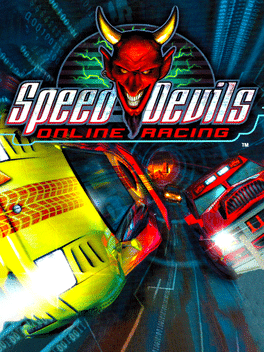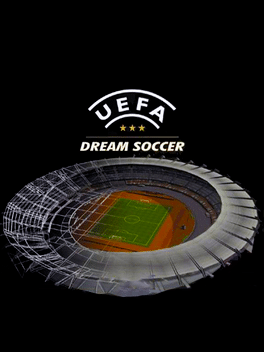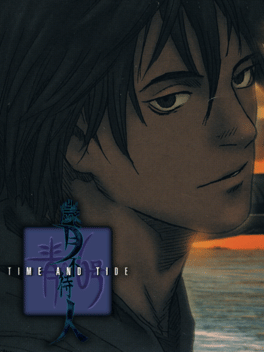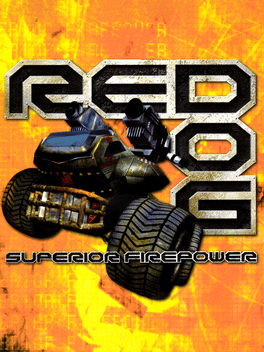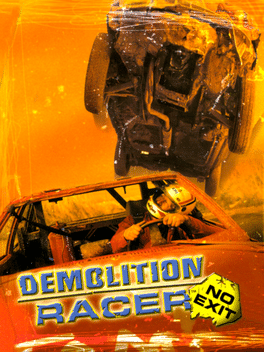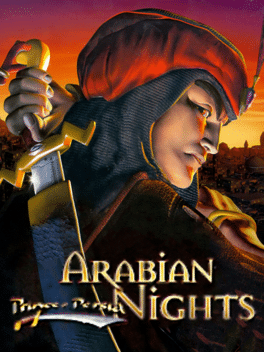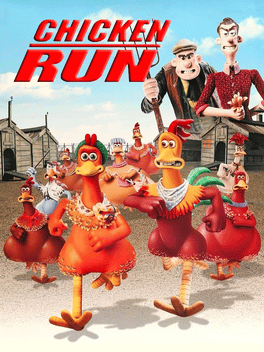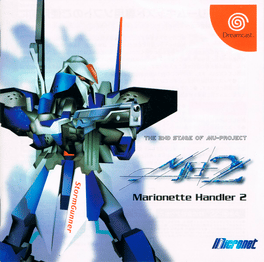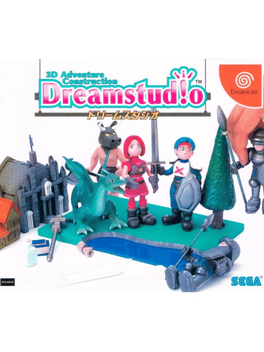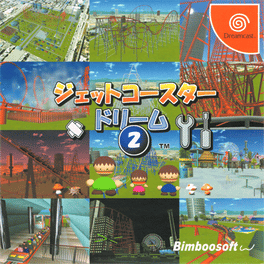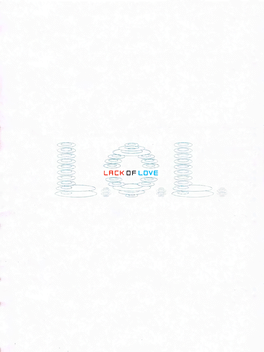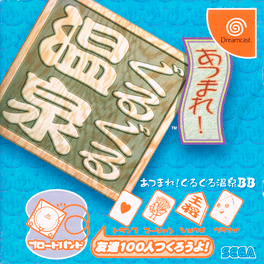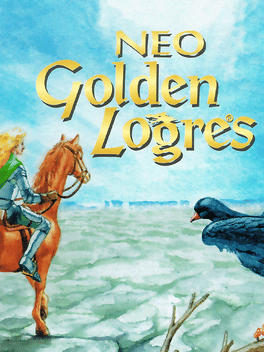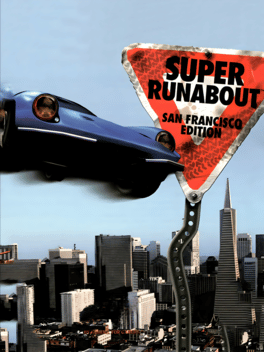New Dc Games - Page 7
-
Speed Devils: Online Racing
2000
Speed Devils: Online Racing is an updated version of Speed Devils that reuses the tracks and cars from the original game, adds new ones, and puts them into completely new modes with a focus on online multiplayer. The game includes online and offline options. Offline functions as a practice mode for online, and has only two modes: Arcade (for a standard race against AI-controlled opponents) and Ghost (for a one-on-one against oneself). At the start, car selection is limited and further cars can only be unlocked by playing online. The meat of the game is in Online mode. After customizing their online persona, players start with $10.000, enough to buy a car of the lowest class. Money must be earned by racing, enabling players to buy new cars and tune them with new parts. There are three kinds of races: Standard, Trial and Vendetta. Standard races allow various ways of earning money, of which winning is only one: breaking speed limits at certain points and setting race records (highest speed, fastest lap time, leadi -
Eldorado Gate Volume 2
2000
El Dorado Gate is console gaming's first serial RPG series, where each Dreamcast GD-ROM contains 3 seperate (though interrelated) adventures, each telling a story of one of the series' 12 characters. There's 7 volumes in all, the first few introducing the characters whilst the later volumes flesh out how their stories are related, leading to the finale. Part of Capcom's experiment of serializing an RPG over a year with one part every other month. -
UEFA Dream Soccer
2000
UEFA Dream Soccer
2000
UEFA Dream Soccer is essentially an update of Sega Worldwide Soccer 2000 (same developer and game engine). The license pertains only to the clubs; player names are fictional. In this version there are also women teams, which look different but play the same. In-game commentary is provided by Alan Green, Barry Venison and Helen Chamberlain. Animation includes 200,000 frames. Internet play was offered by Dreamarena. There is an Arcade mode including game styles such as Time Attack and a Survival knock-out tournament. Traditional mode gives you league competitions and the full World Cup. -
Blue Submarine No. 6: Time and Tide
2000
Blue Submarine No. 6: Time And Tide is an underwater-exploration game developed by Sega and released for the Dreamcast in 2000. The game follows the exploits of a deep-sea salvage crew as they recover treasure. The game includes FMV animation by Gonzo, a renowned Anime studio responsible for the original OVA. -
POD SpeedZone
2000
POD SpeedZone
2000
POD SpeedZone is the sequel to the original POD for the PC. It is a simple, futuristic racer, where you are able to attack your opponents. You are a miner on the colony of Damethra, and an alien virus has taken over the cars on the colony, creating mutant cars. It was one of the first games playable on SegaNet, and one of the only games to support the Dreamcast Broadband Adaptor. This game features eight different vehicles to use on five 3D tracks. -
Red Dog: Superior Firepower
2000
Red Dog: Superior Firepower is a video game released in 2000 for the Sega Dreamcast, it was developed by Argonaut Games PLC. -
Demolition Racer: No Exit
2000
The sequel to Demolition Racer. Race 14 tortuous tracks with mines and crates all over the place slowing you down, racing over 16 savage cars to a sports car to a hearse with its own characteristics to win the race. New game mode "last man standing" where you face all cars in race not for position, but to wreck each other going down a track to see who's last, and "demolition derby" where you fight cars in a arena to see who's last by hitting each other with state-of-the-art graphics where you can see tires, doors, hoods, bumpers, etc. go everywhere. -
Prince of Persia: Arabian Nights
2000
Prince of Persia: Arabian Nights is the Dreamcast port of Prince of Persia 3D. It was developed by Avalanche Software and published by Mattel Interactive in North America a year after the original was released. There are several notable differences between the two versions, the most immediately noticeable one is the movement of prince being much faster in the port. The port also does not have the quicksave/quickload feature unlike the original, and there some level layouts changes ranging from slight modifications to entire levels being just removed. -
Aero Dancing F: Todoroki Tsubasa no Hatsu Hikou
2000
Both Aero Dancing F and i received follow-up titles, with Aero Dancing F: Todoroki Tsubasa no Hatsu Hikou (2000) and Aero Dancing i: Jikai Saku Made Matemasen (2001) being released featuring new missions, planes and environments. -
Chicken Run
2000
-
Marionette Handler 2
2000
-
Dreamstudio
2000
-
Tricolore Crise
2000
Tricolore Crise
2000
Tricolore Crise (which is read as the English word "crisis") is a Japan-only Dreamcast RPG developed by HuneX, a prolific developer of visual novels as well as the Blue Breaker series. Boasting an ATB-influenced battle system and a slew of mostly optional story events loosely set to a calendar, this open-ended fantasy tale in the vein of the early Atelier games tasks the player with guiding a newly formed team of three young women through the examination process that will test whether they are worthy to become masters of one of many magical towers that protect human civilisation from the threat of the Iblis, a savage, menacing, and mysterious race of magical monsters. The player may only control one of the three protagonists at any given time, but may switch freely between them, with certain events only being accessible to certain characters. The three may also each be accompanied in their quest by up to two Mitsukai, or "Angels". These guardian spirits can be freely altered and developed by the player, giving th -
Jet Coaster Dream 2
2000
Jet Coaster Dream 2
2000
A sequel to "Jet Coaster Dream", known as Coaster Works outside of Japan, "Jet Coaster Dream 2" expands the roller coaster building aspects of the first game to include more management of the park itself. The game was originally set for release in the US and Europe, but was cancelled in 2001 due to the discontinuation of the Sega Dreamcast. -
Metropolis Street Racer
2000
star 8.9Gameplay in MSR is centred around the single-player mode, with tracks and cars in the multiplayer mode being unlocked at the same time as in the single-player game. The premise is that, as a street racer, the player must impress other drivers with quick but stylish driving in a series of challenges. These challenges are in sets of ten (called Chapters - there are 25 in total), with completion of all challenges opening the next chapter (assuming the player has enough Kudos, see below) and unlocking a new car. Each challenge is on a different track, and unlocking a challenge unlocks that track in the time-attack and multiplayer modes. -
L.O.L.: Lack of Love
2000
L.O.L.: Lack of Love
2000
L.O.L: Lack Of Love, is an evolutionary adventure game developed by Love-de-Lic and published by ASCII Entertainment for the Sega Dreamcast. The game was released exclusively in Japan on November 2, 2000. -
Atsumare! Guru Guru Onsen BB
2000
Atsumare! Guru Guru Onsen BB (あつまれ!ぐるぐる温泉BB) is a table game for the Sega Dreamcast. -
NBA 2K1
2000
NBA 2K1
2000
star 7.3NBA 2K1 (also known as Sega Sports: NBA 2K1 or NBA2K1) is a basketball video game. It is the second installment in the NBA 2K series of video games. It was developed by Visual Concepts and published by Sega (as Sega Sports). It was the first NBA 2K game to feature online multiplayer and the first game to feature street courses instead of playing a game inside the arena in the first game, famous street courts such as The Cage, Rucker Park, Franklin Park, and Goat Park. It was released on November 1, 2000 in North America with the Dreamcast. Rapper Redman (rapper) appears in the video game -
Neo Golden Logres
2000
Neo Golden Logres
2000
Neo Golden Logres is a Dreamcast port of LittleWing's pinball game Golden Logres, released only in Japan. It included significant gameplay changes, most notably a timer that could only be extended by continuously skillful shooting and a heavyset physics engine that made it much harder than the original. -
Super Runabout: San Francisco Edition
2000
Drive around San Francisco doing odd jobs and stopping a criminal syndicate from taking over. Includes everything from an Indy car to limousine.
